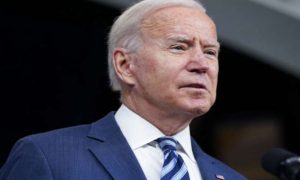A Chinese company’s proposed redevelopment of a grain milling facility near a U.S Air Force base in North Dakota has all but collapsed after Air Force officials warned that the project presents a “significant threat” to national security.
Also Read– U.S. military searches for balloon remnants as China urges restraint
In late 2021, the Chinese bio-fermentation company Fufeng USA announced it would be establishing its first U.S.-based wet corn milling processing plant in the North Dakota city of Grand Forks, bringing with it nearly 800 high-paying jobs and unprecedented market potential for the state’s 13,000 corn growers.
At the time, it seemed like a win for everyone involved.
“I think it puts the city on the map in a big way,” Mayor Brandon Bochenski told the Grand Forks Herald at the time.
There also were glowing quotes from local economic development officials who had fought months for the city to emerge victorious in the company’s competitive selection process.
Also Read- DOJ to investigate Memphis Police Department after Tyre Nichols’ fatal arrest: Mayor
A little more than one year later, however, the project once deemed a game-changer appears all but dead.
On January 27, officials with the U.S. Air Force wrote a letter to North Dakota Senators John Hoeven and Kevin Cramer expressing concerns that the project posed a significant threat to the nearby air base’s operations, all but closing the coffin on a development once deemed “the largest single private capital investment in the region’s history.”
“Grand Forks Air Force Base is the center of military activities related to both air and space operations,” they wrote. “While [the Committee for Foreign Investment in the United States] concluded that it did not have jurisdiction, the Department’s view is unambiguous: the proposed project presents a significant threat to national security with both near- and long-term risks of significant impacts to our operations in the area.”
It is unclear what the threats were. However, by Monday’s city council meeting, local officials had already signaled that they intended to take the first steps necessary to stop the project, the Herald reported, including refusing to connect industrial infrastructure and denying Fufeng the building permits it needed to pursue the project, earning a statement of solidarity and support from Governor Doug Burgum.
Also Read– Honda issues ‘Do Not Drive’ warning for 8,200 U.S. vehicles over air bag risks
“The State of North Dakota stands ready to assist the city in exploring additional opportunities for value-added agriculture,” Burgum said in a statement last week praising the decision. “As our farmers who compete in global markets know, agriculture is a global business, and North Dakota welcomes investment from domestic companies and our friends and allies.”
Newsweek reached out to Bochenski for comment, while Hoeven’s office referred to a statement he and Cramer made last week in opposition to the project.
“The Air Force left ambiguity off the table when they said: ‘The proposed project presents a significant threat to national security with both near- and long-term risks of significant impacts to our operations in the area,'” they wrote. “As we have recommended, we believe the city should discontinue the Fufeng project and instead we should work together to find an American company to develop the agriculture project.”
Shifting U.S.-China dynamics
While Grand Forks’ story is approaching its close, the seemingly isolated episode illustrates a broader story about the rapidly shifting dynamic between the United States and China amid growing diplomatic tensions.
Before the presence of a Chinese weather balloon captured the nation’s attention over the weekend and divided members of Congress over the Biden administration’s response to the episode, state and federal officials stateside have long nursed simmering suspicions over China’s presence in the U.S. rooted not only in China’s capabilities for espionage but in its economic leverage.
Also Read– Trump claims Ron DeSantis cried in front of him while asking for his endorsement back in 2018
Though China has long sought investments in the relatively stable U.S. economy, in recent years, entities like the Committee on Foreign Investment in the United States have begun to increase its scrutiny of investments as part of a larger shift in policy in China’s federal government.
“On the American side, what I’ve noticed is certainly at the national level is that there has been a great increase in attention on the national security relevance of any investment,” Scott Kennedy, senior adviser and trustee chair in Chinese Business and Economics at the Center for Strategic and International Studies, told Newsweek.
President Donald Trump famously launched a trade battle with China that reportedly cost the United States a quarter-million jobs based on the belief that economic policies and previously brokered international trade agreements were leaving U.S. consumers with the short end of the stick.
A bipartisan spending deal last year imposed new restrictions and limitations on Chinese entities seeking to buy U.S.-based tech companies and collaborations between American and Chinese government agencies in several technology sectors. Meanwhile, Congress and state legislatures across the country have begun moving to ban Chinese-owned apps like TikTok, citing security concerns.
Also Read– DOJ to investigate Memphis Police Department after Tyre Nichols’ fatal arrest: Mayor
Agriculture, however, has been a particular sticking point. While bills against Chinese investments have largely been the dominion of red states, late last year, the Democratic-controlled state of California joined a list of more than one-dozen states to pass legislation barring Chinese entities from purchasing agricultural land in the U.S., a move recognized by experts as an expression of anxiety over China’s minuscule—but growing—presence in U.S. food supply chains.
While Chinese-backed entities possess only 1.2 percent of U.S. farmland, according to estimates from the National Agricultural Law Center (NALC), a July letter from several Republican members of Congress to U.S. Agriculture Commissioner Tom Vilsack said that Chinese land holdings had increased from 13,720 acres across the U.S. in 2010 to roughly 352,140 acres in 2020.
The trend has since prompted legislation from figures like Washington Republican Representative Dan Newhouse to prohibit the purchase of public or private agricultural land in the U.S. by foreign nationals associated with the Chinese government, which they have deemed a national security threat.
Also Read– Trellus Local Delivery Grants Available in New York
“We hail from the greatest country in the world, and there is simply no reason we should be reliant on a communist country like China for our food supply,” Newhouse said in a statement at the time promoting the bill, a bipartisan version of which has already been introduced this year.
“If we begin to cede the responsibility over our food supply chain to an adversarial foreign nation, we could be forced into exporting food that is grown within our own borders and meant for our own use.”
The proposals have drawn ample criticism. A proposal in Texas boosted by Republican Governor Greg Abbott has been deemed as racist by Asian-American activists who have equated its language to discriminatory laws dating to the Chinese Exclusion Act of 1883, though its supporters have argued that the law would not affect legal emigrants to the U.S.
Similar legislation in North Dakota has drawn criticism from economic development officials, who noted that Chinese companies have had a largely positive influence on their region’s economies.
Still, the bills have continued to gain momentum. According to the NALC, at least nine other states are considering laws to limit foreign land purchases in their legislative sessions this year.
Also Read– What to know before using a business credit card for your small business
Kennedy cautioned against a “one size fits all” approach in dealing with Chinese industry, however, noting that some have a relatively large degree of autonomy that can work to Americans’ benefit. If any government is to deny any company’s investment in the region, he said, they need to be transparent on why they did so, particularly as geopolitical tensions continue to mount between the two countries.
“As the U.S.-China strategic competition expands, these kinds of cases are going to increase in number,” he said. “Just pulling the veil of national security across these cases is insufficient for the public interest.
Also Read– The Best Small Toolboxes to Stay Organized
“So we have to find some way to balance the need to protect sources and critical information while also giving the public a right to know why these decisions are being made the way they are.”





















